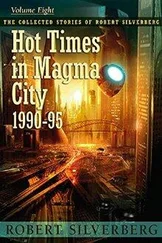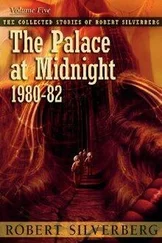Robert Silverberg - How it Was When the Past Went Away
Здесь есть возможность читать онлайн «Robert Silverberg - How it Was When the Past Went Away» весь текст электронной книги совершенно бесплатно (целиком полную версию без сокращений). В некоторых случаях можно слушать аудио, скачать через торрент в формате fb2 и присутствует краткое содержание. Год выпуска: 2007, ISBN: 2007, Издательство: Subterranean Press, Жанр: Фантастика и фэнтези, на английском языке. Описание произведения, (предисловие) а так же отзывы посетителей доступны на портале библиотеки ЛибКат.
- Название:How it Was When the Past Went Away
- Автор:
- Издательство:Subterranean Press
- Жанр:
- Год:2007
- ISBN:978-1-59606-089-0
- Рейтинг книги:4 / 5. Голосов: 1
-
Избранное:Добавить в избранное
- Отзывы:
-
Ваша оценка:
- 80
- 1
- 2
- 3
- 4
- 5
How it Was When the Past Went Away: краткое содержание, описание и аннотация
Предлагаем к чтению аннотацию, описание, краткое содержание или предисловие (зависит от того, что написал сам автор книги «How it Was When the Past Went Away»). Если вы не нашли необходимую информацию о книге — напишите в комментариях, мы постараемся отыскать её.
How it Was When the Past Went Away — читать онлайн бесплатно полную книгу (весь текст) целиком
Ниже представлен текст книги, разбитый по страницам. Система сохранения места последней прочитанной страницы, позволяет с удобством читать онлайн бесплатно книгу «How it Was When the Past Went Away», без необходимости каждый раз заново искать на чём Вы остановились. Поставьте закладку, и сможете в любой момент перейти на страницу, на которой закончили чтение.
Интервал:
Закладка:
A voice in the crowd called, “If you’ve forgotten all about it, how come you’re telling the story to us?”
“A good question! An excellent question!” Haldersen felt sweat bursting from his pores, adrenaline pumping in his veins. “I know the story only because a machine in the hospital told it to me, yesterday morning. But it came to me from the outside, a secondhand tale. The experience of it within me, the scars, all that has been washed away. The pain of it is gone. Oh, yes, I’m sad that my innocent family perished, but a healthy man learns to control his grief after eleven years, he accepts his loss and goes on. I was sick, sick right here, and I couldn’t live with my grief, but now I can, I look on it objectively, do you see! And that’s why I say there’s a blessing in being able to forget. What about you, out there? There must be some of you who suffered painful losses too, and now can no longer remember them, now have been redeemed and released from anguish. Are there any? Are there? Raise your hands. Who’s been bathed in holy oblivion? Who out there knows that he’s been cleansed, even if he can’t remember what it is he’s been cleansed from?”
Hands were starting to go up.
Freddy Munson had spent Thursday afternoon, Thursday night, and all of Friday holed up in his apartment with every communications link to the outside turned off. He neither took nor made calls, ignored the telescreens, and had switched on the xerofax only three times in the thirty-six hours.
He knew that he was finished, and he was trying to decide how to react to it.
His memory situation seemed to have stabilized. He was still missing only five weeks of market maneuvers. There wasn’t any further decay—not that that mattered; he was in trouble enough—and, despite an optimistic statement last night by Mayor Chase, Munson hadn’t seen any evidence that memory loss was reversing itself. He was unable to reconstruct any of the vanished details.
There was no immediate peril, he knew. Most of the clients whose accounts he’d been juggling were wealthy old bats who wouldn’t worry about their stocks until they got next month’s account statements. They had given him discretionary powers, which was how he had been able to tap their resources for his own benefit in the first place. Up to now, Munson had always been able to complete each transaction within a single month, so the account balanced for every statement. He had dealt with the problem of the securities withdrawals that the statements ought to show by gimmicking the house computer to delete all such withdrawals provided there was no net effect from month to month; that way he could borrow 10,000 shares of United Spaceways or Comsat or IBM for two weeks, use the stock as collateral for a deal of his own, and get it back into the proper account in time with no one the wiser. Three weeks from now, though, the end-of-the-month statements were going to go out showing all of his accounts peppered by inexplicable withdrawals, and he was going to catch hell.
The trouble might even start earlier, and come from a different direction. Since the San Francisco trouble had begun, the market had gone down sharply, and he would probably be getting margin calls on Monday. The San Francisco exchange was closed, of course; it hadn’t been able to open Thursday morning because so many of the brokers had been hit hard by amnesia. But New York’s exchanges were open, and they had reacted badly to the news from San Francisco, probably out of fear that a conspiracy was afoot and the whole country might soon be pushed into chaos. When the local exchange opened again on Monday, if it opened, it would most likely open at the last New York prices, or near them, and keep on going down. Munson would be asked to put up cash or additional securities to cover his loans. He certainly didn’t have the cash, and the only way he could get additional securities would be to dip into still more of his accounts, compounding his offense; on the other hand, if he didn’t meet the margin calls they’d sell him out and he’d never be able to restore the stock to the proper accounts, even if he succeeded in remembering which shares went where.
He was trapped. He could stick around for a few weeks, waiting for the ax to fall, or he could get out right now. He preferred to get out right now.
And go where?
Caracas? Reno? Sao Paulo? No, debtor sanctuaries wouldn’t do him any good, because he wasn’t an ordinary debtor. He was a thief, and the sanctuaries didn’t protect criminals, only bankrupts. He had to go farther, all the way to Luna Dome. There wasn’t any extradition from the moon. There’d be no hope of coming back, either.
Munson got on the phone, hoping to reach his travel agent. Two tickets to Luna, please. One for him, one for Helene; if she didn’t feel like coming, he’d go alone. No, not round trip. But the agent didn’t answer. Munson tried the number several times. Shrugging, to decided to order direct, and called United Spaceways next. He got a busy signal. “Shall we wait-list your call?” the data net asked. “It will be three days, at the present state of the backlog of calls, before we can put it through.”
“Forget it,” Munson said.
He had just realized that San Francisco was closed off, anyway. Unless he tried to swim for it, he couldn’t get out of the city to go to the spaceport, even if he did manage to buy tickets to Luna. He was caught here until they opened the transit routes again. How long would that be? Monday, Tuesday, next Friday? They couldn’t keep the city shut forever—could they?
What it came down to, Munson saw, was a contest of probabilities. Would someone discover the discrepancies in his accounts before he found a way of escaping to Luna, or would his escape access become available too late? Put on those terms, it became an in interesting gamble instead of a panic situation. He would spend the weekend trying to find a way out of San Francisco, and if he failed, he would try to be a stoic about facing what was to come.
Calm, now, he remembered that he had promised to lend Paul Mueller a few thousand dollars, to help him equip his studio again. Munson was unhappy over having let that slip his mind. He liked to be helpful. And, even now, what were two or three bigs to him? He had plenty of recoverable assets. Might as well let Paul have a little of the money before the lawyers start grabbing it.
One problem. He had less than a hundred in cash on him—who bothered carrying cash?—and he couldn’t telephone a transfer of funds to Mueller’s account, because Paul didn’t have an account with a data net any more, or even a phone. There wasn’t any place to get that much cash, either, at this hour of evening, especially with the city paralyzed. And the weekend was coming. Munson had an idea, though. What if he went shopping with Mueller tomorrow, and simply charged whatever the sculptor needed to his own account? Fine. He reached for the phone to arrange the date, remembered that Mueller could not be called, and decided to tell Paul about it in person. Now. He could use some fresh air, anyway.
He half expected to find robot bailiffs outside, waiting to arrest him. But of course no one was after him yet. He walked to the garage. It was a fine night, cool, starry, with perhaps just a hint of fog in the west. Berkeley’s lights glittered through the haze. The streets were quiet. In time of crisis people stay home. He drove quickly to Mueller’s place. Four robots were in front of it. Munson eyed them edgily, with the wary look of the man who knows that the sheriff will be after him too in a little while. But Mueller, when he came to the door, took no notice of the dunners.
Munson said, “I’m sorry I missed connections with you. The money I promised to lend you—”
Читать дальшеИнтервал:
Закладка:
Похожие книги на «How it Was When the Past Went Away»
Представляем Вашему вниманию похожие книги на «How it Was When the Past Went Away» списком для выбора. Мы отобрали схожую по названию и смыслу литературу в надежде предоставить читателям больше вариантов отыскать новые, интересные, ещё непрочитанные произведения.
Обсуждение, отзывы о книге «How it Was When the Past Went Away» и просто собственные мнения читателей. Оставьте ваши комментарии, напишите, что Вы думаете о произведении, его смысле или главных героях. Укажите что конкретно понравилось, а что нет, и почему Вы так считаете.












